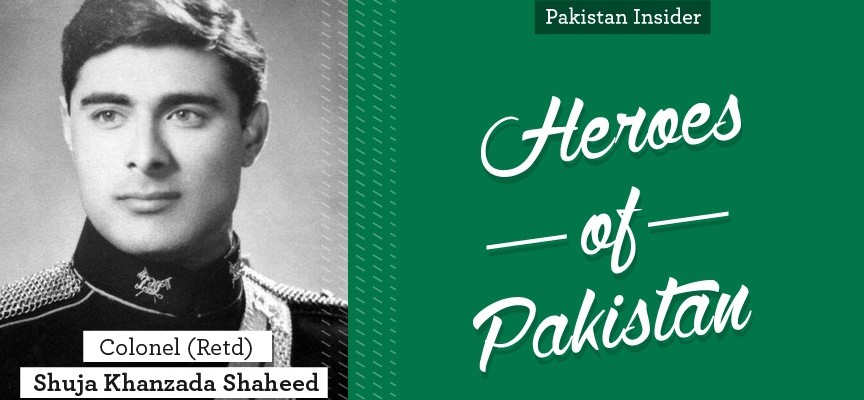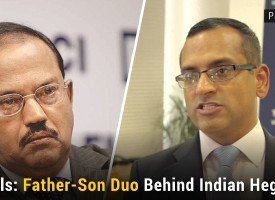On August 16, 2015, Pakistan lost one of its finest sons of the soil. Punjab Home Minister Colonel (retd) Shuja Khanzada Shaheed was an epitome of courage, determination, perseverance, operational vision and bravery. A third generation scion of a family with a legacy of serving in the army, he belonged to the Shadi Khan village of Attock. It was this very location where he was targeted by a suicide bomber and embraced martyrdom during a meeting he was holding to address public grievances.
He was born on August 28, 1943 to a Yousafzai family. After graduating from Islamia College Peshawar in 1966, he was commissioned into 13 Lancers of Pakistan Army’s prestigious Armored Corps the following year. He actively participated in the Indo-Pak War of 1971. For his services, he was awarded with a ‘Tamgha-e-Basalat’ in 1988. He was part of the first troop regiment to reach Siachen in 1983 and later on served as Military Attaché to the Embassy of Pakistan, Washington DC from 1992-1994. After retirement, he formally entered national politics in 2002 as a member of the Punjab Assembly. His national service continued with zeal even while he was not wearing the khaki uniform anymore. Ultimately, he gave his life for the nation as Home (Interior) Minister of Pakistan’s thriving Punjab province.
Shuja Khanzada Shaheed had been receiving threats from a host of adversaries since he assumed office but perhaps he started becoming an eyesore more intensely after the police encounter in Rahim Yar Khan which resulted in the deaths of more than a dozen high-profile most wanted terrorists belonging to the Sipah-e-Sahaba militant wing Lashkar-e-Jhangvi (LeJ). The killing of their leader Malik Ishaq, his sons and senior aides, which many speculated was a case of organized extra-judicial murder, wiped out the senior leadership of LeJ and left the group headless (orphaned). Resultantly, and as expected, a wave of retaliatory attacks began to emerge. Policemen, army officers, politicians, judges, etc are among their targets; the primary and most vital target for them, however, was the man who they believe masterminded the killing of their leaders: Shuja Khanzada Shaheed.
Khazada Shaheed was spearheading counter terrorism efforts in Punjab. He was rightfully known as ‘Punjab’s Counter Terrorism Chief’. Synergizing efforts between the Home Ministry, Police, Rangers, military and intelligence agencies, he ensured that the resolve against terrorism did not get hostage to lack of political willpower or bureaucratic lethargy. What he can be most credited for is focusing not just on Counter Terrorism but most importantly Counter Extremism. The latter is the mother/source of all evils, madrassas where would-be sectarian militants are indoctrinated, radicalized then sent on kill missions.
In his eye-opening report for The Express Tribune dated August 17, 2015, senior journalist Zahid Gishkori quoted statements made by Khanzada Shaheed just a day prior to his martyrdom. “My prime aim is to clear Punjab of militants. Countering sectarian militancy in the province is my mission”, he told The Express Tribune. He added that his newly trained counter terrorism force is “all set to dismantle the network of proscribed organizations in the province”.
Khanzada Shaheed had planned to nip the evil in the bud. This was obviously unacceptable for foreign-sponsored terrorists and some of their supporters in the political and bureaucratic circles. Consequently, it is very possible that his killers were provided some sort of insider help in monitoring his activities. It takes weeks and months to carry out reconnaissance of a target, suitable enough to surprise him at a foreseen situation. Reportedly, Khanzada Shaheed faced the ire of a frustrated and dismembered LeJ which was purportedly on the path of pledging allegiance with Daesh.
In May 2015, Defence Analyst Brigadier (retd) Saad Khan was quoted as saying that Jundullah, Lashkar-e-Jhangvi and other groups have no connections with Daesh since they are affiliated with Al Qaeda. He did however, speculate that “these outfits can later on endorse and adopt the ideology of any group”. It was noted by observers after Malik Ishaq and gang’s killing that Ahle Sunnat Wal Jamaat (ASWJ) chief Mohammad Ahmed Ludhianvi had not attended Ishaq’s funeral since his group had distanced itself from militancy like that of its offshoot LeJ. Ludhianvi’s group believes in electoral politics. LeJ was, over the course of time, becoming a heavy burden on ASWJ itself because of its anti-state activities.
Interestingly, a disputable report on a Pakistani online media website published a report claiming that Syrian intelligence officials captured one of Malik Ishaq’s fighters named ‘Amjad Muawiya’ in Damascus, who was fighting against the regime. The report further claims that Syrian authorities allegedly shared detailed information about a nexus between LeJ and Daesh; the most damning claim in the report is that LeJ and Jundullah personnel allegedly held a meeting with Daesh representatives at Quetta sometime in September-October 2014 in which they pledged allegiance to Daesh. These details have not been reported elsewhere so we will not delve into further speculations.
Perhaps Khazada Shaheed’s boldest actions were the orders to close 170 seminaries in South Punjab, which were a source of extremism and sectarianism. According to an anonymous official quoted in The Express Tribune report, marked seminaries in Jhang, Muzaffargarh, Layyah, Rajanpur, Dera Ghazi Khan, Kot Addu, Chiniot, Taunsa, Hasilpur and Vehari were shut down. Reportedly, Khanzada Shaheed was also following the financial trail of terrorists. Approximately Rs. 600 million of suspected funding to some madrassas was frozen.
Khanzada Shaheed was a man of his word. Unlike many of his spineless colleagues and contemporaries, he put his own self on the frontline against the enemies of Pakistan and Pakistanis. Without fearing for his own life (mainstream media reported extensively about his very meagre personal security), he successfully put many feathers into his cap: revitalizing the Home Ministry for better coordination with the Ministry of Interior and timely cooperation with provincial Law Enforcement Agencies (LEAs), establishment of a Counter Terrorism Force and recruitment/training of qualified male and female commandos at the Elite Force Training School, formulation and dissemination of all-encompassing security guidelines, security protocol guidelines for foreigners, etc. And, who can forget, his most popular effort; ensuring the fool-proof security of Zimbabwe’s cricket team which was on a playing tour to Lahore.
Martyrs never die, they remain alive with Allah’s Mercy and Blessings. Their legacy lives on, passed from one generation to the next. Khanzada Shaheed’s loss was the most impactful one after the tragic Army Public School (APS) Peshawar attacks of December 2014 in which scores of school children and staff members were butchered at the hands of anti-state terrorists.
At present, there is no one in the entire PML-N ranks who is as remotely committed, determined, courageous and bold as Colonel (retd) Shuja Khanzada Shaheed. The dilemma which Punjab province now faces is the absence of a substitute who could continue the Shaheed’s mission with the same level of enthusiasm, honesty and commitment. The Government of Punjab’s gross negligence, such as poor security for the Shaheed Home Minister, has rendered its own counter terrorism and counter extremism programs headless too. The enemies chose their target well.
Who will pick up where Khanzada Shaheed left off? Whoever gets selected, will he be mindful of the tremendous responsibilities on his shoulders? Let’s hope so. An unfit appointment might damage ongoing activities or even undo the fruitful efforts already made. The Government of Punjab will have to tread very carefully; a wrong decision is simply unaffordable.








No comments!
There are no comments yet, but you can be first to comment this article.